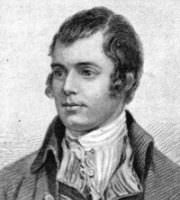by Robert Burns
WHEN Nature her great master-piece design’d,
And fram’d her last, best work, the human mind,
Her eye intent on all the mazy plan,
She form’d of various parts the various Man.
Then first she calls the useful many forth;
Plain plodding Industry, and sober Worth:
Thence peasants, farmers, native sons of earth,
And merchandise’ whole genus take their birth:
Each prudent cit a warm existence finds,
And all mechanics’ many-apron’d kinds.
Some other rarer sorts are wanted yet,
The lead and buoy are needful to the net:
The caput mortuum of gross desires
Makes a material for mere knights and squires;
The martial phosphorus is taught to flow,
She kneads the lumpish philosophic dough,
Then marks th’ unyielding mass with grave designs,
Law, physic, politics, and deep divines;
Last, she sublimes th’ Aurora of the poles,
The flashing elements of female souls.
The order’d system fair before her stood,
Nature, well pleas’d, pronounc’d it very good;
But ere she gave creating labour o’er,
Half-jest, she tried one curious labour more.
Some spumy, fiery, ignis fatuus matter,
Such as the slightest breath of air might scatter;
With arch-alacrity and conscious glee,
(Nature may have her whim as well as we,
Her Hogarth-art perhaps she meant to show it),
She forms the thing and christens it—a Poet:
Creature, tho’ oft the prey of care and sorrow,
When blest to-day, unmindful of to-morrow;
A being form’d t’ amuse his graver friends,
Admir’d and prais’d-and there the homage ends;
A mortal quite unfit for Fortune’s strife,
Yet oft the sport of all the ills of life;
Prone to enjoy each pleasure riches give,
Yet haply wanting wherewithal to live;
Longing to wipe each tear, to heal each groan,
Yet frequent all unheeded in his own.
But honest Nature is not quite a Turk,
She laugh’d at first, then felt for her poor work:
Pitying the propless climber of mankind,
She cast about a standard tree to find;
And, to support his helpless woodbine state,
Attach’d him to the generous, truly great:
A title, and the only one I claim,
To lay strong hold for help on bounteous Graham.
Pity the tuneful Muses’ hapless train,
Weak, timid landsmen on life’s stormy main!
Their hearts no selfish stern absorbent stuff,
That never gives—tho’ humbly takes enough;
The little fate allows, they share as soon,
Unlike sage proverb’d Wisdom’s hard-wrung boon:
The world were blest did bliss on them depend,
Ah, that “the friendly e’er should want a friend!”
Let Prudence number o’er each sturdy son,
Who life and wisdom at one race begun,
Who feel by reason and who give by rule,
(Instinct’s a brute, and sentiment a fool!)
Who make poor “will do” wait upon “I should”—
We own they’re prudent, but who feels they’re good?
Ye wise ones hence! ye hurt the social eye!
God’s image rudely etch’d on base alloy!
But come ye who the godlike pleasure know,
Heaven’s attribute distinguished—to bestow!
Whose arms of love would grasp the human race:
Come thou who giv’st with all a courtier’s grace;
FRIEND OF MY LIFE, true patron of my rhymes!
Prop of my dearest hopes for future times.
Why shrinks my soul half blushing, half afraid,
Backward, abash’d to ask thy friendly aid?
I know my need, I know thy giving hand,
I crave thy friendship at thy kind command;
But there are such who court the tuneful Nine—
Heavens! should the branded character be mine!
Whose verse in manhood’s pride sublimely flows,
Yet vilest reptiles in their begging prose.
Mark, how their lofty independent spirit
Soars on the spurning wing of injured merit!
Seek not the proofs in private life to find
Pity the best of words should be but wind!
So, to heaven’s gates the lark’s shrill song ascends,
But grovelling on the earth the carol ends.
In all the clam’rous cry of starving want,
They dun Benevolence with shameless front;
Oblige them, patronise their tinsel lays—
They persecute you all your future days!
Ere my poor soul such deep damnation stain,
My horny fist assume the plough again,
The pie-bald jacket let me patch once more,
On eighteenpence a week I’ve liv’d before.
Tho’, thanks to Heaven, I dare even that last shift,
I trust, meantime, my boon is in thy gift:
That, plac’d by thee upon the wish’d-for height,
Where, man and nature fairer in her sight,
My Muse may imp her wing for some sublimer flight.
Last updated July 13, 2015




